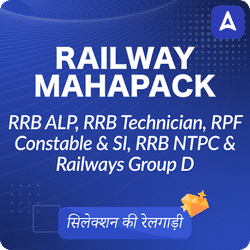Table of Contents
Preparing for the Railway NTPC and Group D exams requires a well-organized approach, as these exams cover a range of topics, including Mathematics, General Awareness, and Reasoning. Understanding the exam pattern, analyzing the syllabus, and practicing with mock tests and previous papers are essential steps for success.
Preparing for the Railway NTPC (Non-Technical Popular Categories) and Group D exams requires a strategic and disciplined approach. Here’s a comprehensive guide to help you get started:
Understand the RRB NTPC and Group D Exam Pattern
The first step in your preparation is to familiarize yourself with the exam pattern for both NTPC and Group D.
RRB NTPC Exam Pattern
| RRB NTPC Exam Pattern | CBT 1 | CBT 2 |
| Subject | Questions | Marks |
| Mathematics | 30 | 30 |
| General Intelligence & Reasoning | 30 | 30 |
| General Awareness | 40 | 40 |
| Total | 100 | 100 |
| Duration | 1 hour 30 minutes | 1 hour 30 minutes |
RRB Group D Exam Pattern
| RRB Group D Exam Pattern | Questions | Duration |
| General Intelligence & Reasoning | 30 |
90 minutes |
| General Awareness & Current Affairs | 20 | |
| General Science | 25 | |
| Mathematics | 25 | |
| Total | 100 |
RRB NTPC and Group D Exam Syllabus
The RRB NTPC and Group D exams are highly competitive and require a thorough understanding of the syllabus for effective preparation. Both exams test candidates in key areas like Mathematics, General Intelligence & Reasoning, General Awareness, General Science in RRB Group D Syllabus. Familiarizing yourself with the detailed syllabus for each subject is crucial to building a well-rounded study plan that covers all essential topics and enhances your chances of success.
Guide for RRB NTPC Exam Preparation
Know the Syllabus: A clear understanding of the RRB NTPC syllabus is vital. Focus on major sections: General Awareness, Mathematics, and Reasoning, allowing you to strategize and cover essential topics efficiently.
Analyze Cut-Off Trends: Study previous cut-off marks to gauge the required score and difficulty level, which can help adjust your preparation approach and set realistic goals.
Self-Assessment: previous papers help identify strengths and weaknesses, allowing targeted practice in areas needing improvement.
Focus on Practice and Revision: Regularly solve past question papers and attempt to boost speed, accuracy, and confidence. Prioritize high-weightage topics in your revision plan.
Balanced Approach to Study and Health: Manage your study time efficiently, taking breaks and maintaining physical well-being, which enhances focus and reduces stress.
Key Resources: Utilize the RRB official website, previous year papers, and recommended textbooks. Online communities and coaching can also provide support and additional materials.
Exam Day Strategy: Balance speed and accuracy to minimize errors, especially under timed conditions, and stay calm to avoid last-minute stress.
Preparation Tips for RRB NTPC and Group D
Realistic Schedule: Allocate time for each subject based on your strengths and weaknesses.
Consistent Practice: Daily practice of problems, particularly in Mathematics and Reasoning, is essential.
Mock Tests: Regularly take mock tests to simulate exam conditions and improve time management.
Books & Resources: Use official Railway exam preparation books and other recommended study materials.
Prioritize Weak Areas: Dedicate more time to subjects where you need improvement.
| Related Articles | |
| RRB NTPC Previous Year Question Papers | SSC CGL vs SSC MTS: Which One is Better? |




 RRB ALP Salary 2025, Check Job Profile a...
RRB ALP Salary 2025, Check Job Profile a...
 RRC SECR Apprentice Recruitment 2025 Out...
RRC SECR Apprentice Recruitment 2025 Out...
 RRB Group D Salary 2025, Job Profile and...
RRB Group D Salary 2025, Job Profile and...


